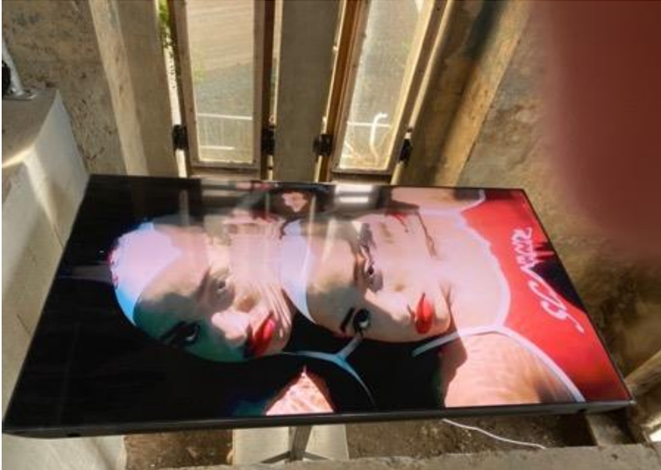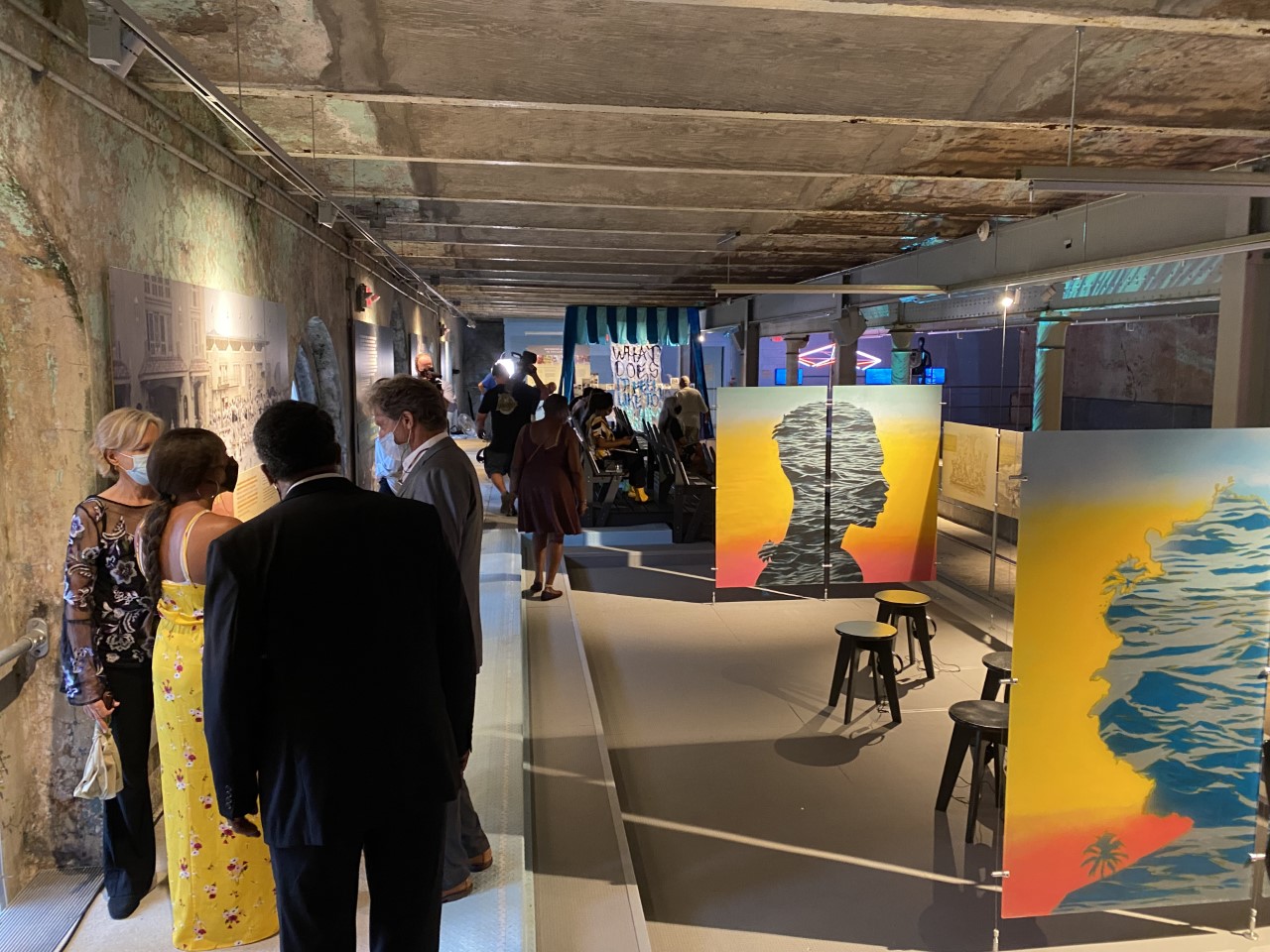“POOL: A Social History of Segregation”


Rachel and Brianna Holmes of the Santa Clara, California Aquamaid Artistic Swimming Club
WHAT
“Pool: A Social History of Segregation” (POOL) is a 4,700 square foot museum exhibition that investigates the nation’s handling of race as it relates to public pools.
- Visitors will be immersed in a curated collection of art installations and experiences, including rarely seen archival
- film footage and photographs.
- Voices of swimming and social justice icons contribute to an enlightening and inspirational experience.
WHERE
- The Fairmount Water Works, 640 Water Works Drive, Philadelphia, Pennsylvania
- Limited free parking is available on Water Works Drive. Paid parking is available in the Philadelphia Museum of Art
- (PMA) parking areas. Public transportation to the PMA will get you near the Water Works
HOURS & INFO: This exhibit has now ended.
Wednesday, March 22 (World Water Day) from 11:00am – 5:00pm, then:
- Wednesday – Saturday from 11:00 a.m. – 5:00 p.m. through September 30, 2023
- Admission is free.
- More information and content from the exhibition can be found at poolphl.com.
- For more than 200 years, the Fairmount Water Works has told the story of our connection with water. Located on historic Boat House Row, it operated as a pumping station from 1815 to 1909, an aquarium from 1911 to 1962, as the Kelly Pool until 1972, and today serves as the Philadelphia Water Department’s public education destination, housing an award-winning urban environmental education center.
- Major support for POOL has been provided by The Pew Center for Arts & Heritage, with additional support from the Philadelphia Water Department. Much of the historical content was researched and referenced by Dr. Jeff Wiltse, author of Contested Waters: the History of Racial Discrimination in Swimming. We would also like to thank leadership of the Fund for the Fairmount Water Works and Philadelphia Parks and Recreation for their ongoing support for this project.
- Info on directions, parking, and transit can be found here.
STATEMENT FROM THE EXECUTIVE DIRECTOR
“This project is a natural extension of our mission to educate the public about the important role of water in our daily lives. With the goal of deepening understanding of the connection between water, social justice and public health, visitors to POOL can contribute to the conversation.” Karen Young, Executive Director, Fairmount Water Works Interpretive Center.
NATIONAL STATISTICS
Racial discrimination at swimming pools, coupled with a general shift of funds away from public pools, has had a significant and lasting impact on Black communities.

- According to the Centers for Disease Control and Prevention, Black youth are almost 6 times as likely as white children
to drown in a swimming pool - USA Swimming reports that 69% of Black children have little to no swimming ability, compared with 42% of white
children. - In Pennsylvania, Black children have a 50% higher rate of accidental drowning than white children – 1.2 deaths per 100,000 population for Blacks vs. 0.8 deaths per 100,000 for whites. This disparity has remained unchanged for
more than 20 years.
PHILADELPHIA CONNECTIONS
Philadelphia opened the first outdoor municipal pool in the United States in 1883, and has the largest number of
public pools per resident of any major American city—70+ pools, one per every 22,000 Philadelphians.
- The Kelly Natatorium, or Kelly Pool, also known as the ‘Aquarium Pool’, opened in 1961 as a training facility funded by John Kelly, father of actress Grace Kelly. Years prior, it housed the Philadelphia Aquarium, which was installed in 1911 in the space once occupied by machinery used to pump water through the Fairmount Water Works. It then became a public pool, but was in use only until 1972, when it was damaged by flooding from Hurricane Agnes.
- In 1959, several middle-class African-American families living in the Philadelphia suburb of Yeadon founded a private swimming club named the Nile Swim Club after they were denied membership at nearby swim clubs. Sixty years later, “The Nile” is still in operation, serving its membership and running “No Child Will Drown in Our Town,” a program that provides free swimming lessons to children.
- In 1969, Malachi and Olivia Cunningham established the Tigershark Aquatic Association to serve inner-city co-ed swimmers, Black and white.
- In 1971, swim coach Jim Ellis formed the PDR Swim Team (a/k/a “Philadelphia Department of Recreation”, or “Pride, Determination, Resilience”) to make competitive swimming an option for inner city youth, and improve pool access for all Black swimmers. His successful program produces regional and national champions and became a model for other urban swim teams around the country. In 2007, the film Pride starring Terrence Howard, based on the life story of Coach Ellis and the success of PDR, was released.
- Philadelphia’s BLJ Community Rowing founded by Bannon Johnson is the only Black-owned and operated rowing organization in the country. It is dedicated to promoting the sport of rowing and acting as stewards of the Schuylkill River.
- In 2004, twenty Philadelphia public pools were slated to be closed due to financial constraints but Philadelphians protested and they remained open due to community advocacy. Philadelphia’s Parks & Recreation Department continues to enliven Philadelphia’s pools through beautification and restoration, and free swimming and safety lessons through the progressive Swim Philly, PowerCorpsPHL and We Can Swim! programs.
PHILADELPHIA AREA ARTISTS
- POOL project creator, creative director and lead designer Victoria Prizzia is founder of Habitheque Inc., which developed the award-winning interpretive exhibits for Fairmount Water Works, The International Seaport Museum, Philadelphia Flower Show, and more. “Access to water is a right which continues to be challenged. POOL brings this history to light, so that the next generation can continue the push for positive social change.”
- Prizzia worked with regional artists to create original site-specific work, including a large-scale mural series that welcomes audiences with colorful, sensual watery imagery printed on acrylic by street artist Calo Rosa that promise to evoke the feeling of being one with the element of water.
- Whispers from the Deep is a commissioned work by Homer Jackson, telling stories via video, animations and poetry.
- Water Born, by animation artist Lowell Boston, explores reflections of people of all ages on the Black experience with swimming.
- Playwright, director and educator James Ijames created a new site-specific animated film titled Moving Portraits, exploring six key moments in the history of segregated swimming.
- Graphic novel and comic book artist Dylan B. Caleho provides graphic imagery for Moving Portraits, and created Threshold Hallway, exploring key moments in the history of segregated swimming.
- Swim Baby Swim: Look Up is by Modupeola Fadugba, a multimedia artist whose works explore cultural identity, social justice, game theory, and the art world. She lives and works in between Abuja, Nigeria and Philadelphia.
MEDIA CONTACTS
Interviews and photo files upon request.
Nancy Becker, 15 Minutes Inc. Marketing and Media, 215-290-7668, Nancy@15minutesinc.com
-or-
Dionne Watts-Williams, Fairmount Water Works, dionne.WattsWilliams@phila.gov

Relevant Links
- The Pew Center for Arts & Heritage recently announced the Fairmount Water Work’s POOL project as one of 39 project grants and fellowships for 2019 in support of Philadelphia’s cultural organizations and artists.
- The POOL: A Social History of Segregation exhibit emerges from adversity (Broad Street Review, March 16, 2022)
- Understanding Segregation – At the Swimming Pool (March 22, 2022)
- The new exhibit “POOL” explores how the legacy of segregated pools still denies Black people the joy of water. (Philadelphia Inquirer, March 24, 2022)
- Download the POOL press kit here.
